Ethical and Professional Standards: Transition to Occupational Therapy
VerifiedAdded on 2023/06/10
|12
|2806
|239
Essay
AI Summary
This essay explores the critical importance of ethical and professional standards in occupational therapy, emphasizing their role in ensuring safe and effective practice and safeguarding the well-being of service users. The author reflects on their personal development needs, particularly in gaining comprehensive knowledge of ethical standards and addressing the diverse needs of service users from various cultural backgrounds. The essay highlights the challenges and dilemmas occupational therapists face, such as balancing emotional connections with adherence to professional standards, and underscores the necessity of a strong ethical framework to navigate complex situations. Referencing the Health and Care Professions Council (HCPC) Standards of Proficiency and the Royal College of Occupational Therapists (RCOT) Code of Ethics and Professional Conduct, the essay argues that a thorough understanding of these standards is crucial for aspiring occupational therapists to provide culturally sensitive, ethical, and effective care, ultimately supporting their transition into qualified and registered professionals. Desklib offers a platform to access similar solved assignments and past papers for students.
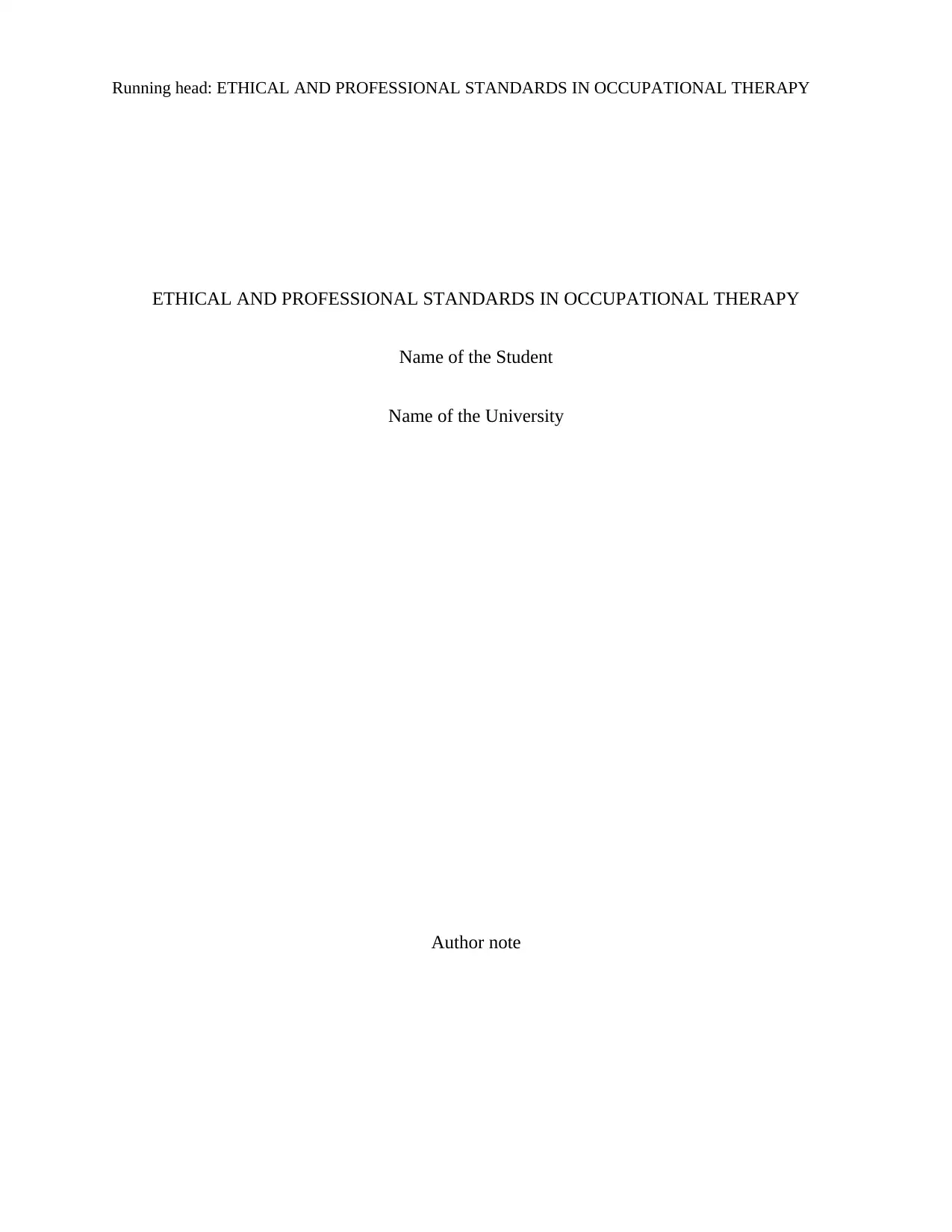
Running head: ETHICAL AND PROFESSIONAL STANDARDS IN OCCUPATIONAL THERAPY
ETHICAL AND PROFESSIONAL STANDARDS IN OCCUPATIONAL THERAPY
Name of the Student
Name of the University
Author note
ETHICAL AND PROFESSIONAL STANDARDS IN OCCUPATIONAL THERAPY
Name of the Student
Name of the University
Author note
Paraphrase This Document
Need a fresh take? Get an instant paraphrase of this document with our AI Paraphraser
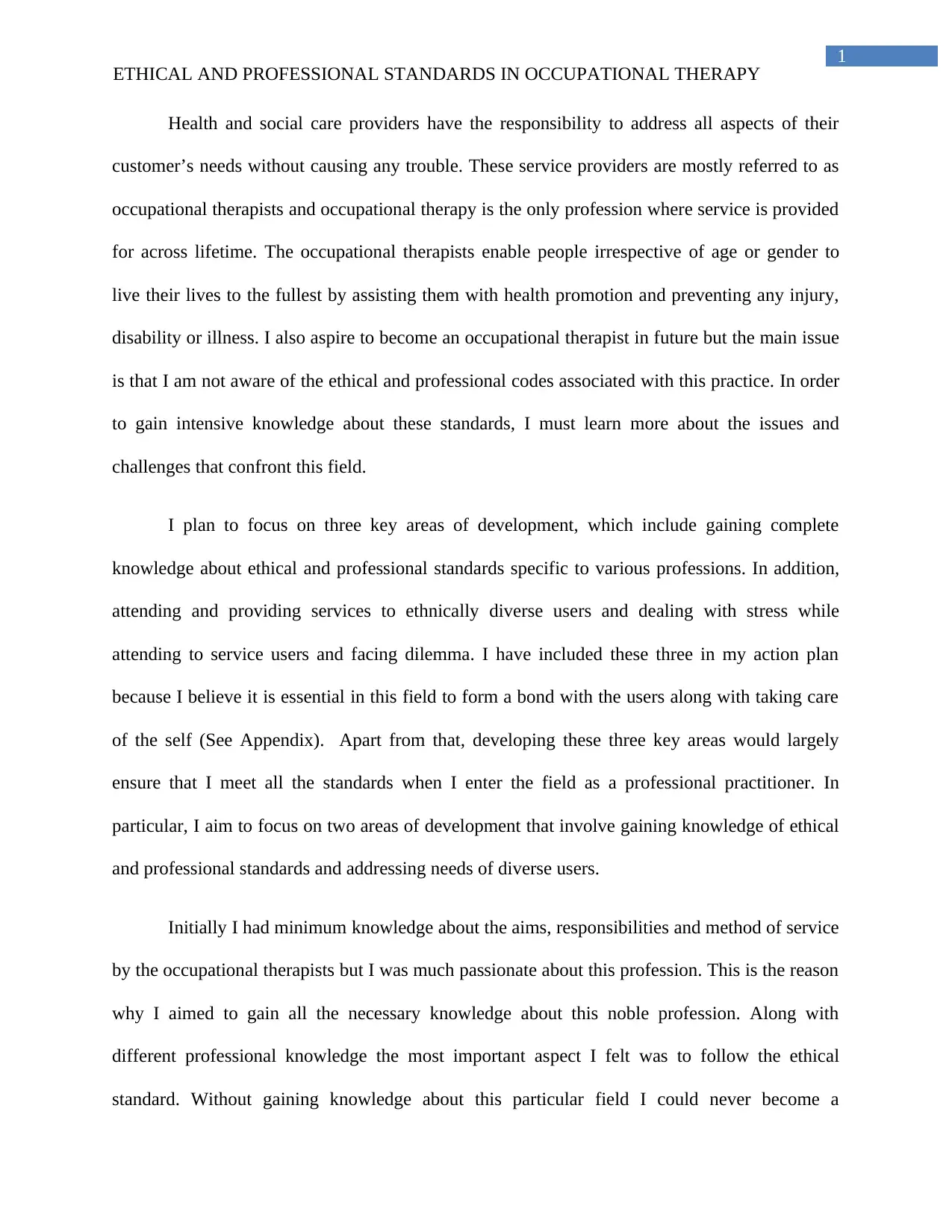
1
ETHICAL AND PROFESSIONAL STANDARDS IN OCCUPATIONAL THERAPY
Health and social care providers have the responsibility to address all aspects of their
customer’s needs without causing any trouble. These service providers are mostly referred to as
occupational therapists and occupational therapy is the only profession where service is provided
for across lifetime. The occupational therapists enable people irrespective of age or gender to
live their lives to the fullest by assisting them with health promotion and preventing any injury,
disability or illness. I also aspire to become an occupational therapist in future but the main issue
is that I am not aware of the ethical and professional codes associated with this practice. In order
to gain intensive knowledge about these standards, I must learn more about the issues and
challenges that confront this field.
I plan to focus on three key areas of development, which include gaining complete
knowledge about ethical and professional standards specific to various professions. In addition,
attending and providing services to ethnically diverse users and dealing with stress while
attending to service users and facing dilemma. I have included these three in my action plan
because I believe it is essential in this field to form a bond with the users along with taking care
of the self (See Appendix). Apart from that, developing these three key areas would largely
ensure that I meet all the standards when I enter the field as a professional practitioner. In
particular, I aim to focus on two areas of development that involve gaining knowledge of ethical
and professional standards and addressing needs of diverse users.
Initially I had minimum knowledge about the aims, responsibilities and method of service
by the occupational therapists but I was much passionate about this profession. This is the reason
why I aimed to gain all the necessary knowledge about this noble profession. Along with
different professional knowledge the most important aspect I felt was to follow the ethical
standard. Without gaining knowledge about this particular field I could never become a
ETHICAL AND PROFESSIONAL STANDARDS IN OCCUPATIONAL THERAPY
Health and social care providers have the responsibility to address all aspects of their
customer’s needs without causing any trouble. These service providers are mostly referred to as
occupational therapists and occupational therapy is the only profession where service is provided
for across lifetime. The occupational therapists enable people irrespective of age or gender to
live their lives to the fullest by assisting them with health promotion and preventing any injury,
disability or illness. I also aspire to become an occupational therapist in future but the main issue
is that I am not aware of the ethical and professional codes associated with this practice. In order
to gain intensive knowledge about these standards, I must learn more about the issues and
challenges that confront this field.
I plan to focus on three key areas of development, which include gaining complete
knowledge about ethical and professional standards specific to various professions. In addition,
attending and providing services to ethnically diverse users and dealing with stress while
attending to service users and facing dilemma. I have included these three in my action plan
because I believe it is essential in this field to form a bond with the users along with taking care
of the self (See Appendix). Apart from that, developing these three key areas would largely
ensure that I meet all the standards when I enter the field as a professional practitioner. In
particular, I aim to focus on two areas of development that involve gaining knowledge of ethical
and professional standards and addressing needs of diverse users.
Initially I had minimum knowledge about the aims, responsibilities and method of service
by the occupational therapists but I was much passionate about this profession. This is the reason
why I aimed to gain all the necessary knowledge about this noble profession. Along with
different professional knowledge the most important aspect I felt was to follow the ethical
standard. Without gaining knowledge about this particular field I could never become a
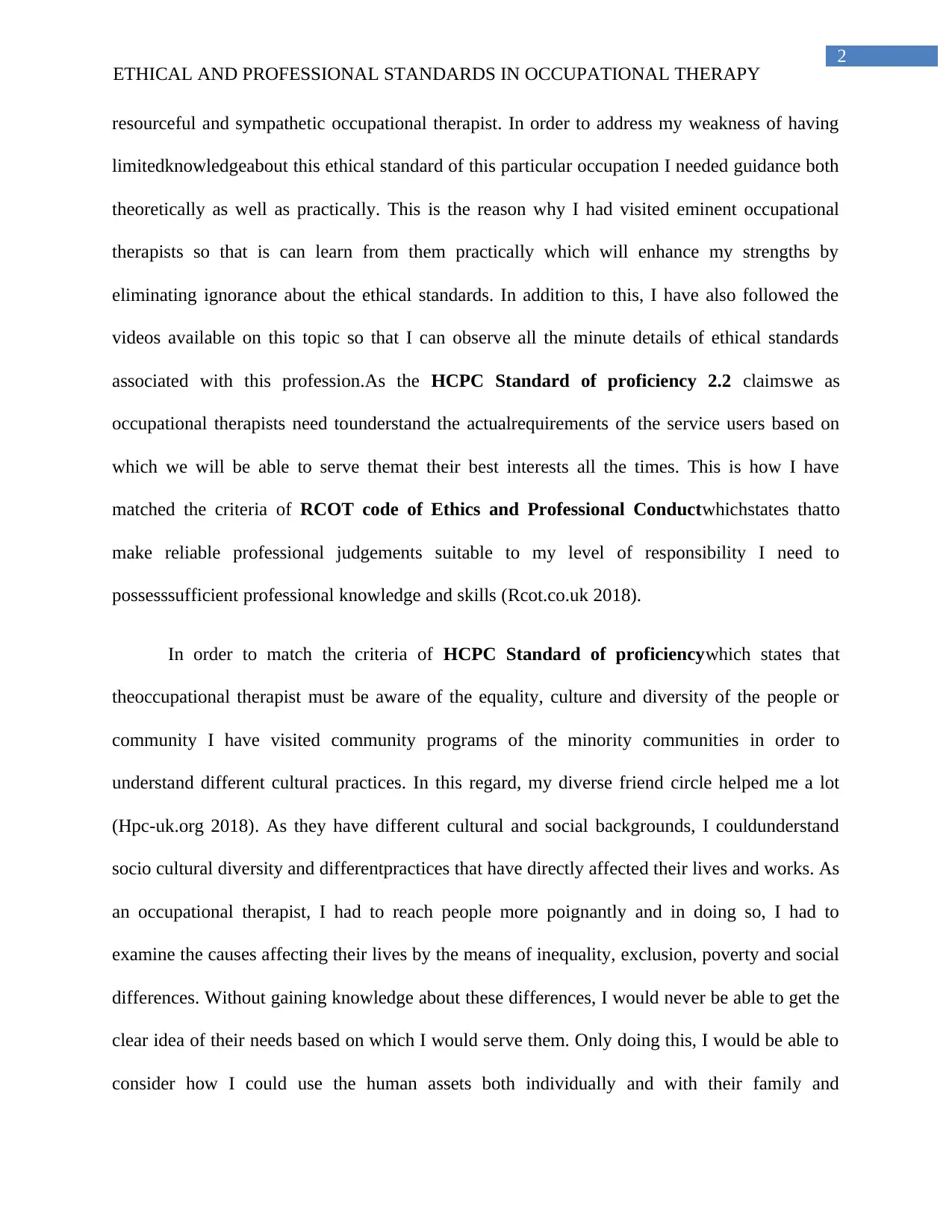
2
ETHICAL AND PROFESSIONAL STANDARDS IN OCCUPATIONAL THERAPY
resourceful and sympathetic occupational therapist. In order to address my weakness of having
limitedknowledgeabout this ethical standard of this particular occupation I needed guidance both
theoretically as well as practically. This is the reason why I had visited eminent occupational
therapists so that is can learn from them practically which will enhance my strengths by
eliminating ignorance about the ethical standards. In addition to this, I have also followed the
videos available on this topic so that I can observe all the minute details of ethical standards
associated with this profession.As the HCPC Standard of proficiency 2.2 claimswe as
occupational therapists need tounderstand the actualrequirements of the service users based on
which we will be able to serve themat their best interests all the times. This is how I have
matched the criteria of RCOT code of Ethics and Professional Conductwhichstates thatto
make reliable professional judgements suitable to my level of responsibility I need to
possesssufficient professional knowledge and skills (Rcot.co.uk 2018).
In order to match the criteria of HCPC Standard of proficiencywhich states that
theoccupational therapist must be aware of the equality, culture and diversity of the people or
community I have visited community programs of the minority communities in order to
understand different cultural practices. In this regard, my diverse friend circle helped me a lot
(Hpc-uk.org 2018). As they have different cultural and social backgrounds, I couldunderstand
socio cultural diversity and differentpractices that have directly affected their lives and works. As
an occupational therapist, I had to reach people more poignantly and in doing so, I had to
examine the causes affecting their lives by the means of inequality, exclusion, poverty and social
differences. Without gaining knowledge about these differences, I would never be able to get the
clear idea of their needs based on which I would serve them. Only doing this, I would be able to
consider how I could use the human assets both individually and with their family and
ETHICAL AND PROFESSIONAL STANDARDS IN OCCUPATIONAL THERAPY
resourceful and sympathetic occupational therapist. In order to address my weakness of having
limitedknowledgeabout this ethical standard of this particular occupation I needed guidance both
theoretically as well as practically. This is the reason why I had visited eminent occupational
therapists so that is can learn from them practically which will enhance my strengths by
eliminating ignorance about the ethical standards. In addition to this, I have also followed the
videos available on this topic so that I can observe all the minute details of ethical standards
associated with this profession.As the HCPC Standard of proficiency 2.2 claimswe as
occupational therapists need tounderstand the actualrequirements of the service users based on
which we will be able to serve themat their best interests all the times. This is how I have
matched the criteria of RCOT code of Ethics and Professional Conductwhichstates thatto
make reliable professional judgements suitable to my level of responsibility I need to
possesssufficient professional knowledge and skills (Rcot.co.uk 2018).
In order to match the criteria of HCPC Standard of proficiencywhich states that
theoccupational therapist must be aware of the equality, culture and diversity of the people or
community I have visited community programs of the minority communities in order to
understand different cultural practices. In this regard, my diverse friend circle helped me a lot
(Hpc-uk.org 2018). As they have different cultural and social backgrounds, I couldunderstand
socio cultural diversity and differentpractices that have directly affected their lives and works. As
an occupational therapist, I had to reach people more poignantly and in doing so, I had to
examine the causes affecting their lives by the means of inequality, exclusion, poverty and social
differences. Without gaining knowledge about these differences, I would never be able to get the
clear idea of their needs based on which I would serve them. Only doing this, I would be able to
consider how I could use the human assets both individually and with their family and
⊘ This is a preview!⊘
Do you want full access?
Subscribe today to unlock all pages.

Trusted by 1+ million students worldwide
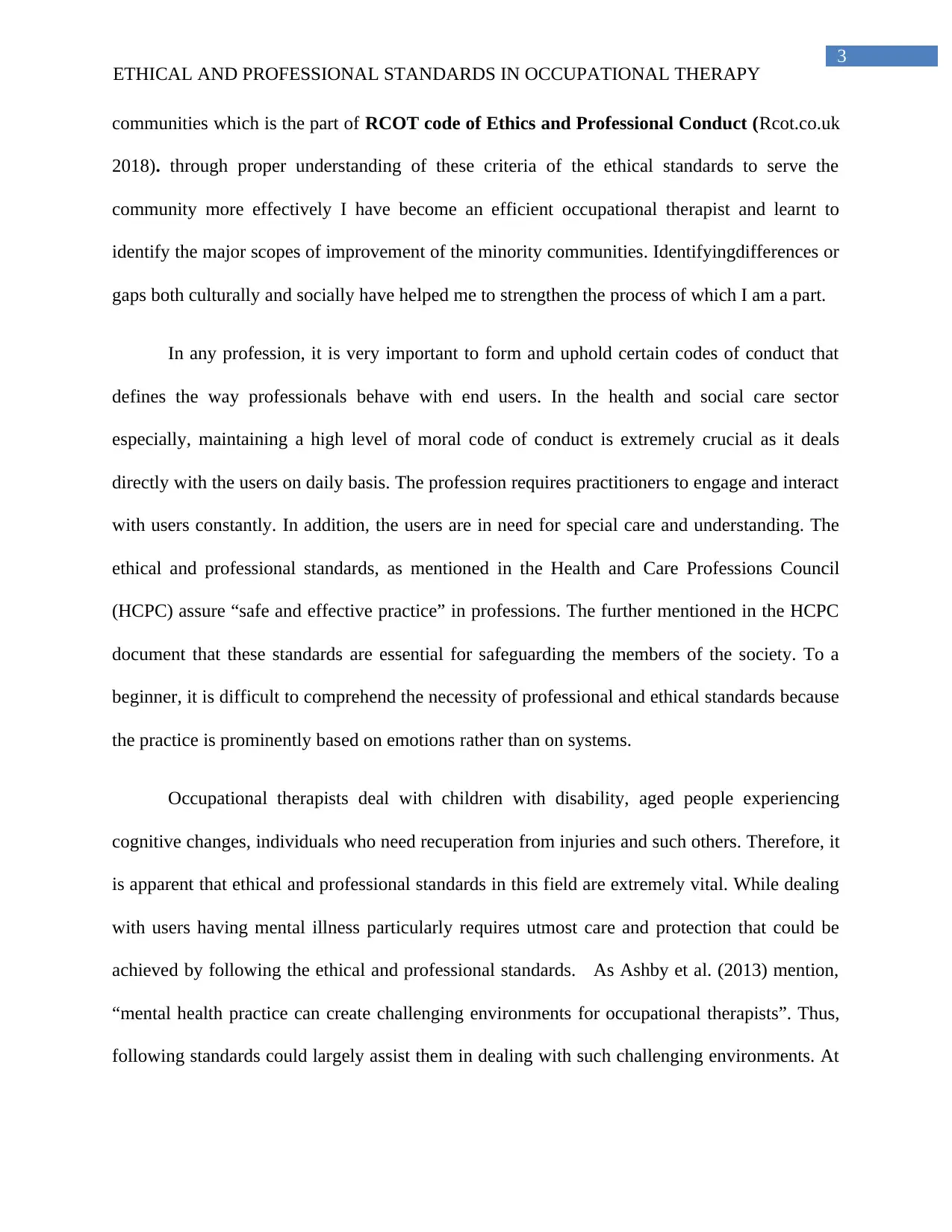
3
ETHICAL AND PROFESSIONAL STANDARDS IN OCCUPATIONAL THERAPY
communities which is the part of RCOT code of Ethics and Professional Conduct (Rcot.co.uk
2018). through proper understanding of these criteria of the ethical standards to serve the
community more effectively I have become an efficient occupational therapist and learnt to
identify the major scopes of improvement of the minority communities. Identifyingdifferences or
gaps both culturally and socially have helped me to strengthen the process of which I am a part.
In any profession, it is very important to form and uphold certain codes of conduct that
defines the way professionals behave with end users. In the health and social care sector
especially, maintaining a high level of moral code of conduct is extremely crucial as it deals
directly with the users on daily basis. The profession requires practitioners to engage and interact
with users constantly. In addition, the users are in need for special care and understanding. The
ethical and professional standards, as mentioned in the Health and Care Professions Council
(HCPC) assure “safe and effective practice” in professions. The further mentioned in the HCPC
document that these standards are essential for safeguarding the members of the society. To a
beginner, it is difficult to comprehend the necessity of professional and ethical standards because
the practice is prominently based on emotions rather than on systems.
Occupational therapists deal with children with disability, aged people experiencing
cognitive changes, individuals who need recuperation from injuries and such others. Therefore, it
is apparent that ethical and professional standards in this field are extremely vital. While dealing
with users having mental illness particularly requires utmost care and protection that could be
achieved by following the ethical and professional standards. As Ashby et al. (2013) mention,
“mental health practice can create challenging environments for occupational therapists”. Thus,
following standards could largely assist them in dealing with such challenging environments. At
ETHICAL AND PROFESSIONAL STANDARDS IN OCCUPATIONAL THERAPY
communities which is the part of RCOT code of Ethics and Professional Conduct (Rcot.co.uk
2018). through proper understanding of these criteria of the ethical standards to serve the
community more effectively I have become an efficient occupational therapist and learnt to
identify the major scopes of improvement of the minority communities. Identifyingdifferences or
gaps both culturally and socially have helped me to strengthen the process of which I am a part.
In any profession, it is very important to form and uphold certain codes of conduct that
defines the way professionals behave with end users. In the health and social care sector
especially, maintaining a high level of moral code of conduct is extremely crucial as it deals
directly with the users on daily basis. The profession requires practitioners to engage and interact
with users constantly. In addition, the users are in need for special care and understanding. The
ethical and professional standards, as mentioned in the Health and Care Professions Council
(HCPC) assure “safe and effective practice” in professions. The further mentioned in the HCPC
document that these standards are essential for safeguarding the members of the society. To a
beginner, it is difficult to comprehend the necessity of professional and ethical standards because
the practice is prominently based on emotions rather than on systems.
Occupational therapists deal with children with disability, aged people experiencing
cognitive changes, individuals who need recuperation from injuries and such others. Therefore, it
is apparent that ethical and professional standards in this field are extremely vital. While dealing
with users having mental illness particularly requires utmost care and protection that could be
achieved by following the ethical and professional standards. As Ashby et al. (2013) mention,
“mental health practice can create challenging environments for occupational therapists”. Thus,
following standards could largely assist them in dealing with such challenging environments. At
Paraphrase This Document
Need a fresh take? Get an instant paraphrase of this document with our AI Paraphraser
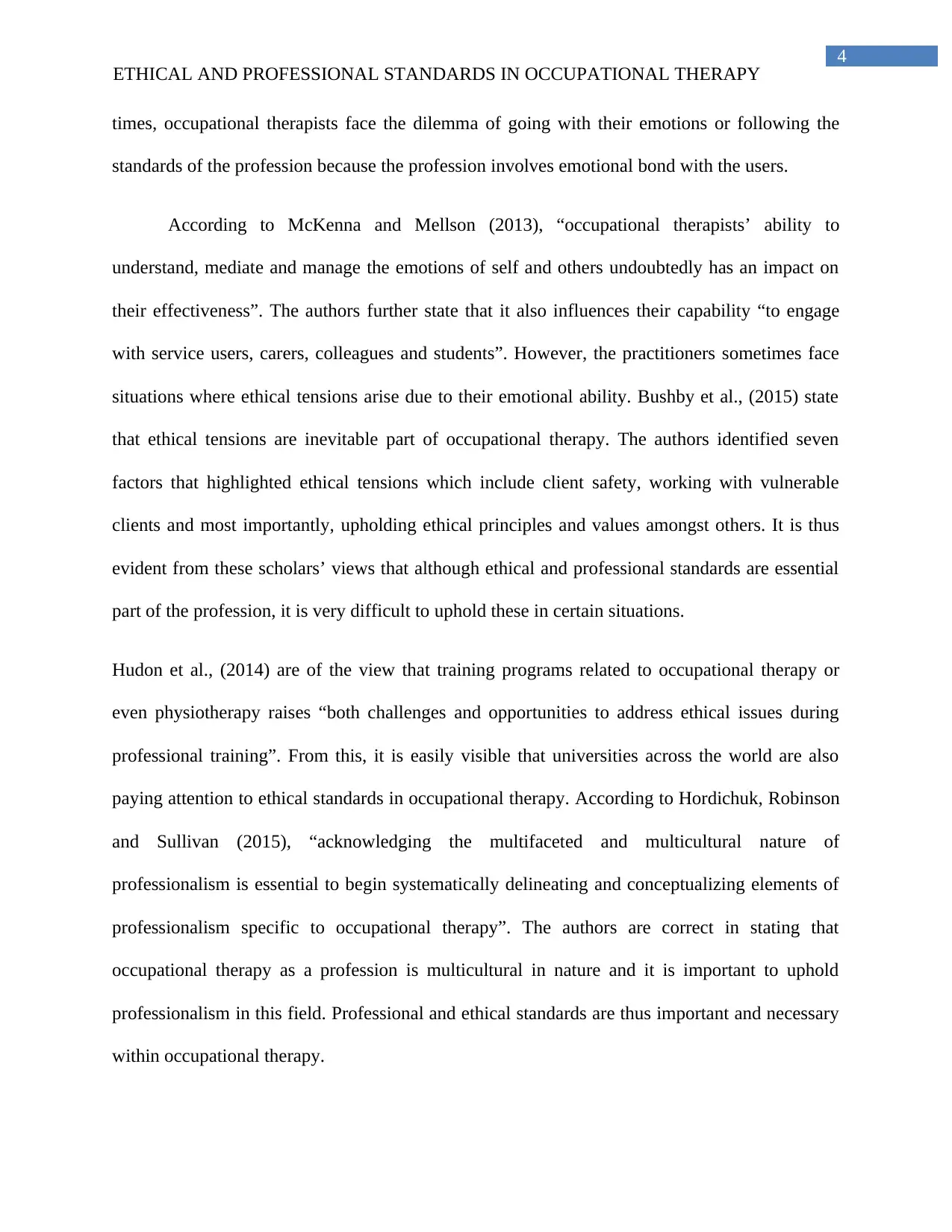
4
ETHICAL AND PROFESSIONAL STANDARDS IN OCCUPATIONAL THERAPY
times, occupational therapists face the dilemma of going with their emotions or following the
standards of the profession because the profession involves emotional bond with the users.
According to McKenna and Mellson (2013), “occupational therapists’ ability to
understand, mediate and manage the emotions of self and others undoubtedly has an impact on
their effectiveness”. The authors further state that it also influences their capability “to engage
with service users, carers, colleagues and students”. However, the practitioners sometimes face
situations where ethical tensions arise due to their emotional ability. Bushby et al., (2015) state
that ethical tensions are inevitable part of occupational therapy. The authors identified seven
factors that highlighted ethical tensions which include client safety, working with vulnerable
clients and most importantly, upholding ethical principles and values amongst others. It is thus
evident from these scholars’ views that although ethical and professional standards are essential
part of the profession, it is very difficult to uphold these in certain situations.
Hudon et al., (2014) are of the view that training programs related to occupational therapy or
even physiotherapy raises “both challenges and opportunities to address ethical issues during
professional training”. From this, it is easily visible that universities across the world are also
paying attention to ethical standards in occupational therapy. According to Hordichuk, Robinson
and Sullivan (2015), “acknowledging the multifaceted and multicultural nature of
professionalism is essential to begin systematically delineating and conceptualizing elements of
professionalism specific to occupational therapy”. The authors are correct in stating that
occupational therapy as a profession is multicultural in nature and it is important to uphold
professionalism in this field. Professional and ethical standards are thus important and necessary
within occupational therapy.
ETHICAL AND PROFESSIONAL STANDARDS IN OCCUPATIONAL THERAPY
times, occupational therapists face the dilemma of going with their emotions or following the
standards of the profession because the profession involves emotional bond with the users.
According to McKenna and Mellson (2013), “occupational therapists’ ability to
understand, mediate and manage the emotions of self and others undoubtedly has an impact on
their effectiveness”. The authors further state that it also influences their capability “to engage
with service users, carers, colleagues and students”. However, the practitioners sometimes face
situations where ethical tensions arise due to their emotional ability. Bushby et al., (2015) state
that ethical tensions are inevitable part of occupational therapy. The authors identified seven
factors that highlighted ethical tensions which include client safety, working with vulnerable
clients and most importantly, upholding ethical principles and values amongst others. It is thus
evident from these scholars’ views that although ethical and professional standards are essential
part of the profession, it is very difficult to uphold these in certain situations.
Hudon et al., (2014) are of the view that training programs related to occupational therapy or
even physiotherapy raises “both challenges and opportunities to address ethical issues during
professional training”. From this, it is easily visible that universities across the world are also
paying attention to ethical standards in occupational therapy. According to Hordichuk, Robinson
and Sullivan (2015), “acknowledging the multifaceted and multicultural nature of
professionalism is essential to begin systematically delineating and conceptualizing elements of
professionalism specific to occupational therapy”. The authors are correct in stating that
occupational therapy as a profession is multicultural in nature and it is important to uphold
professionalism in this field. Professional and ethical standards are thus important and necessary
within occupational therapy.
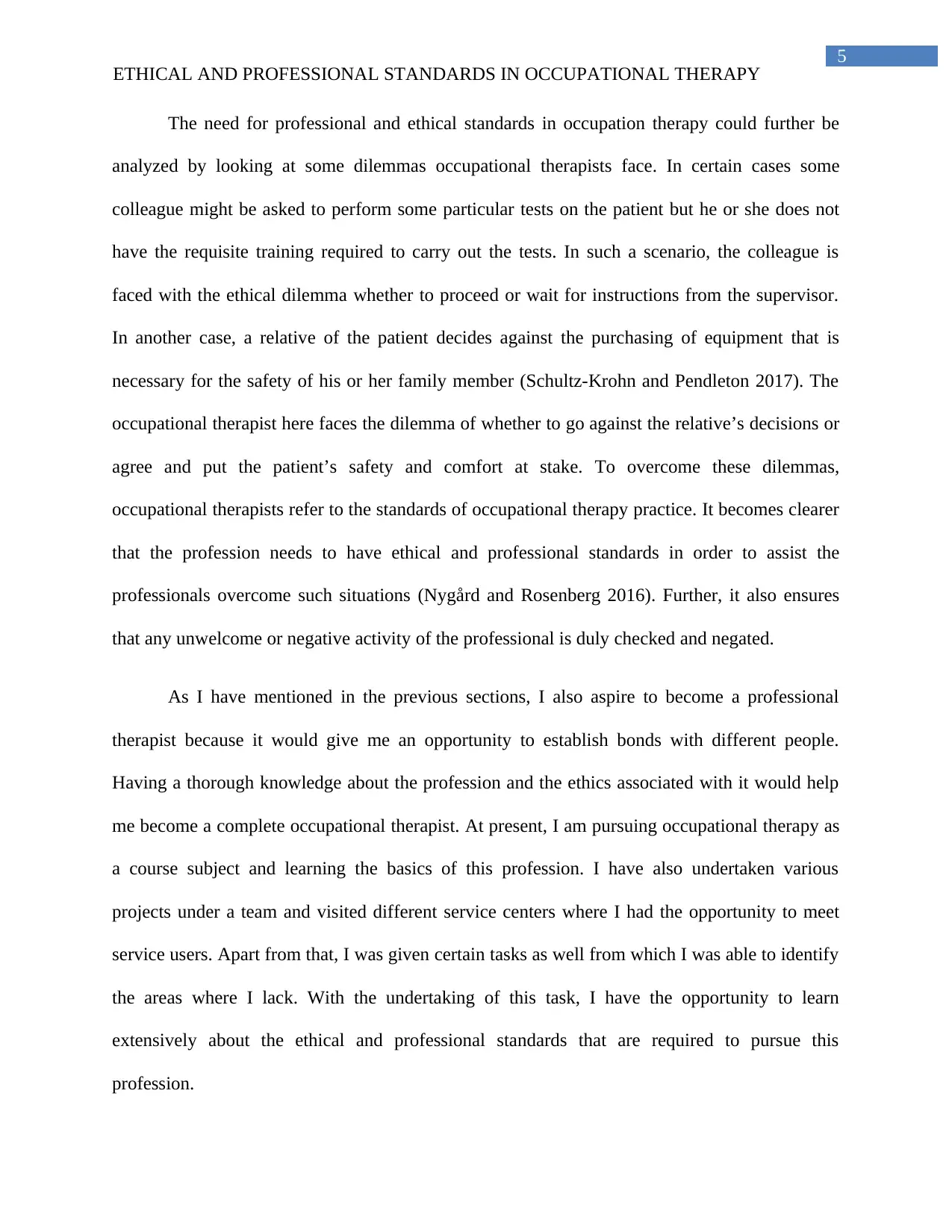
5
ETHICAL AND PROFESSIONAL STANDARDS IN OCCUPATIONAL THERAPY
The need for professional and ethical standards in occupation therapy could further be
analyzed by looking at some dilemmas occupational therapists face. In certain cases some
colleague might be asked to perform some particular tests on the patient but he or she does not
have the requisite training required to carry out the tests. In such a scenario, the colleague is
faced with the ethical dilemma whether to proceed or wait for instructions from the supervisor.
In another case, a relative of the patient decides against the purchasing of equipment that is
necessary for the safety of his or her family member (Schultz-Krohn and Pendleton 2017). The
occupational therapist here faces the dilemma of whether to go against the relative’s decisions or
agree and put the patient’s safety and comfort at stake. To overcome these dilemmas,
occupational therapists refer to the standards of occupational therapy practice. It becomes clearer
that the profession needs to have ethical and professional standards in order to assist the
professionals overcome such situations (Nygård and Rosenberg 2016). Further, it also ensures
that any unwelcome or negative activity of the professional is duly checked and negated.
As I have mentioned in the previous sections, I also aspire to become a professional
therapist because it would give me an opportunity to establish bonds with different people.
Having a thorough knowledge about the profession and the ethics associated with it would help
me become a complete occupational therapist. At present, I am pursuing occupational therapy as
a course subject and learning the basics of this profession. I have also undertaken various
projects under a team and visited different service centers where I had the opportunity to meet
service users. Apart from that, I was given certain tasks as well from which I was able to identify
the areas where I lack. With the undertaking of this task, I have the opportunity to learn
extensively about the ethical and professional standards that are required to pursue this
profession.
ETHICAL AND PROFESSIONAL STANDARDS IN OCCUPATIONAL THERAPY
The need for professional and ethical standards in occupation therapy could further be
analyzed by looking at some dilemmas occupational therapists face. In certain cases some
colleague might be asked to perform some particular tests on the patient but he or she does not
have the requisite training required to carry out the tests. In such a scenario, the colleague is
faced with the ethical dilemma whether to proceed or wait for instructions from the supervisor.
In another case, a relative of the patient decides against the purchasing of equipment that is
necessary for the safety of his or her family member (Schultz-Krohn and Pendleton 2017). The
occupational therapist here faces the dilemma of whether to go against the relative’s decisions or
agree and put the patient’s safety and comfort at stake. To overcome these dilemmas,
occupational therapists refer to the standards of occupational therapy practice. It becomes clearer
that the profession needs to have ethical and professional standards in order to assist the
professionals overcome such situations (Nygård and Rosenberg 2016). Further, it also ensures
that any unwelcome or negative activity of the professional is duly checked and negated.
As I have mentioned in the previous sections, I also aspire to become a professional
therapist because it would give me an opportunity to establish bonds with different people.
Having a thorough knowledge about the profession and the ethics associated with it would help
me become a complete occupational therapist. At present, I am pursuing occupational therapy as
a course subject and learning the basics of this profession. I have also undertaken various
projects under a team and visited different service centers where I had the opportunity to meet
service users. Apart from that, I was given certain tasks as well from which I was able to identify
the areas where I lack. With the undertaking of this task, I have the opportunity to learn
extensively about the ethical and professional standards that are required to pursue this
profession.
⊘ This is a preview!⊘
Do you want full access?
Subscribe today to unlock all pages.

Trusted by 1+ million students worldwide
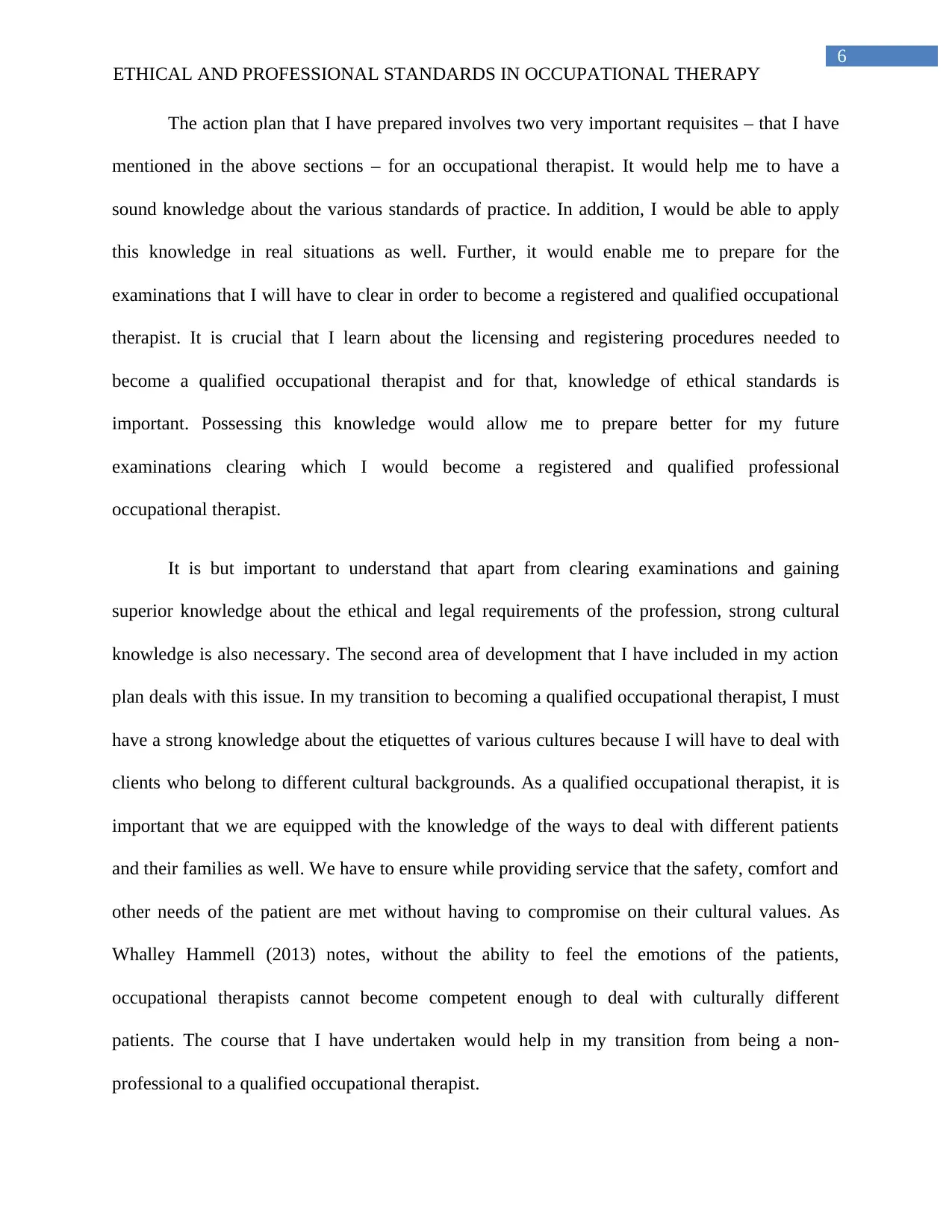
6
ETHICAL AND PROFESSIONAL STANDARDS IN OCCUPATIONAL THERAPY
The action plan that I have prepared involves two very important requisites – that I have
mentioned in the above sections – for an occupational therapist. It would help me to have a
sound knowledge about the various standards of practice. In addition, I would be able to apply
this knowledge in real situations as well. Further, it would enable me to prepare for the
examinations that I will have to clear in order to become a registered and qualified occupational
therapist. It is crucial that I learn about the licensing and registering procedures needed to
become a qualified occupational therapist and for that, knowledge of ethical standards is
important. Possessing this knowledge would allow me to prepare better for my future
examinations clearing which I would become a registered and qualified professional
occupational therapist.
It is but important to understand that apart from clearing examinations and gaining
superior knowledge about the ethical and legal requirements of the profession, strong cultural
knowledge is also necessary. The second area of development that I have included in my action
plan deals with this issue. In my transition to becoming a qualified occupational therapist, I must
have a strong knowledge about the etiquettes of various cultures because I will have to deal with
clients who belong to different cultural backgrounds. As a qualified occupational therapist, it is
important that we are equipped with the knowledge of the ways to deal with different patients
and their families as well. We have to ensure while providing service that the safety, comfort and
other needs of the patient are met without having to compromise on their cultural values. As
Whalley Hammell (2013) notes, without the ability to feel the emotions of the patients,
occupational therapists cannot become competent enough to deal with culturally different
patients. The course that I have undertaken would help in my transition from being a non-
professional to a qualified occupational therapist.
ETHICAL AND PROFESSIONAL STANDARDS IN OCCUPATIONAL THERAPY
The action plan that I have prepared involves two very important requisites – that I have
mentioned in the above sections – for an occupational therapist. It would help me to have a
sound knowledge about the various standards of practice. In addition, I would be able to apply
this knowledge in real situations as well. Further, it would enable me to prepare for the
examinations that I will have to clear in order to become a registered and qualified occupational
therapist. It is crucial that I learn about the licensing and registering procedures needed to
become a qualified occupational therapist and for that, knowledge of ethical standards is
important. Possessing this knowledge would allow me to prepare better for my future
examinations clearing which I would become a registered and qualified professional
occupational therapist.
It is but important to understand that apart from clearing examinations and gaining
superior knowledge about the ethical and legal requirements of the profession, strong cultural
knowledge is also necessary. The second area of development that I have included in my action
plan deals with this issue. In my transition to becoming a qualified occupational therapist, I must
have a strong knowledge about the etiquettes of various cultures because I will have to deal with
clients who belong to different cultural backgrounds. As a qualified occupational therapist, it is
important that we are equipped with the knowledge of the ways to deal with different patients
and their families as well. We have to ensure while providing service that the safety, comfort and
other needs of the patient are met without having to compromise on their cultural values. As
Whalley Hammell (2013) notes, without the ability to feel the emotions of the patients,
occupational therapists cannot become competent enough to deal with culturally different
patients. The course that I have undertaken would help in my transition from being a non-
professional to a qualified occupational therapist.
Paraphrase This Document
Need a fresh take? Get an instant paraphrase of this document with our AI Paraphraser
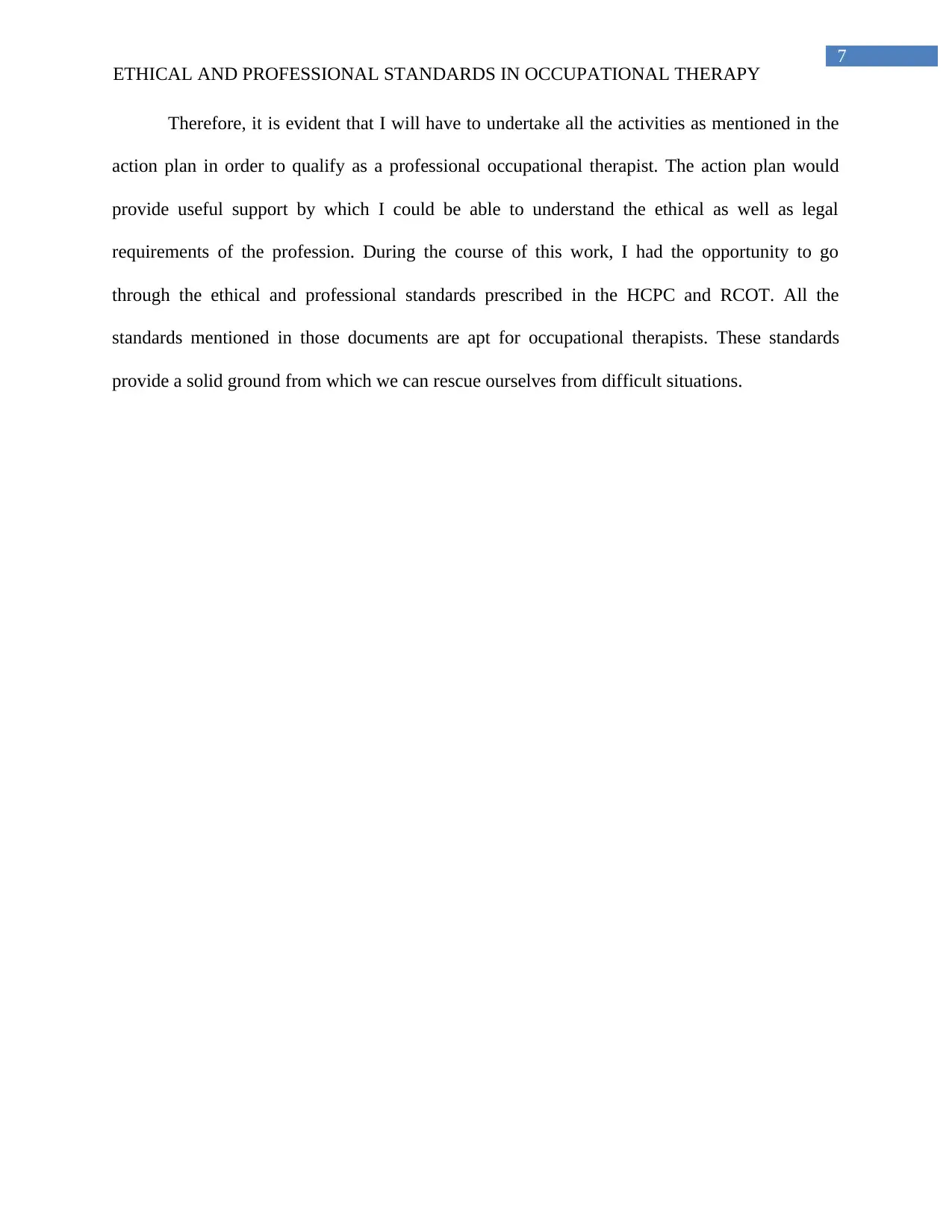
7
ETHICAL AND PROFESSIONAL STANDARDS IN OCCUPATIONAL THERAPY
Therefore, it is evident that I will have to undertake all the activities as mentioned in the
action plan in order to qualify as a professional occupational therapist. The action plan would
provide useful support by which I could be able to understand the ethical as well as legal
requirements of the profession. During the course of this work, I had the opportunity to go
through the ethical and professional standards prescribed in the HCPC and RCOT. All the
standards mentioned in those documents are apt for occupational therapists. These standards
provide a solid ground from which we can rescue ourselves from difficult situations.
ETHICAL AND PROFESSIONAL STANDARDS IN OCCUPATIONAL THERAPY
Therefore, it is evident that I will have to undertake all the activities as mentioned in the
action plan in order to qualify as a professional occupational therapist. The action plan would
provide useful support by which I could be able to understand the ethical as well as legal
requirements of the profession. During the course of this work, I had the opportunity to go
through the ethical and professional standards prescribed in the HCPC and RCOT. All the
standards mentioned in those documents are apt for occupational therapists. These standards
provide a solid ground from which we can rescue ourselves from difficult situations.
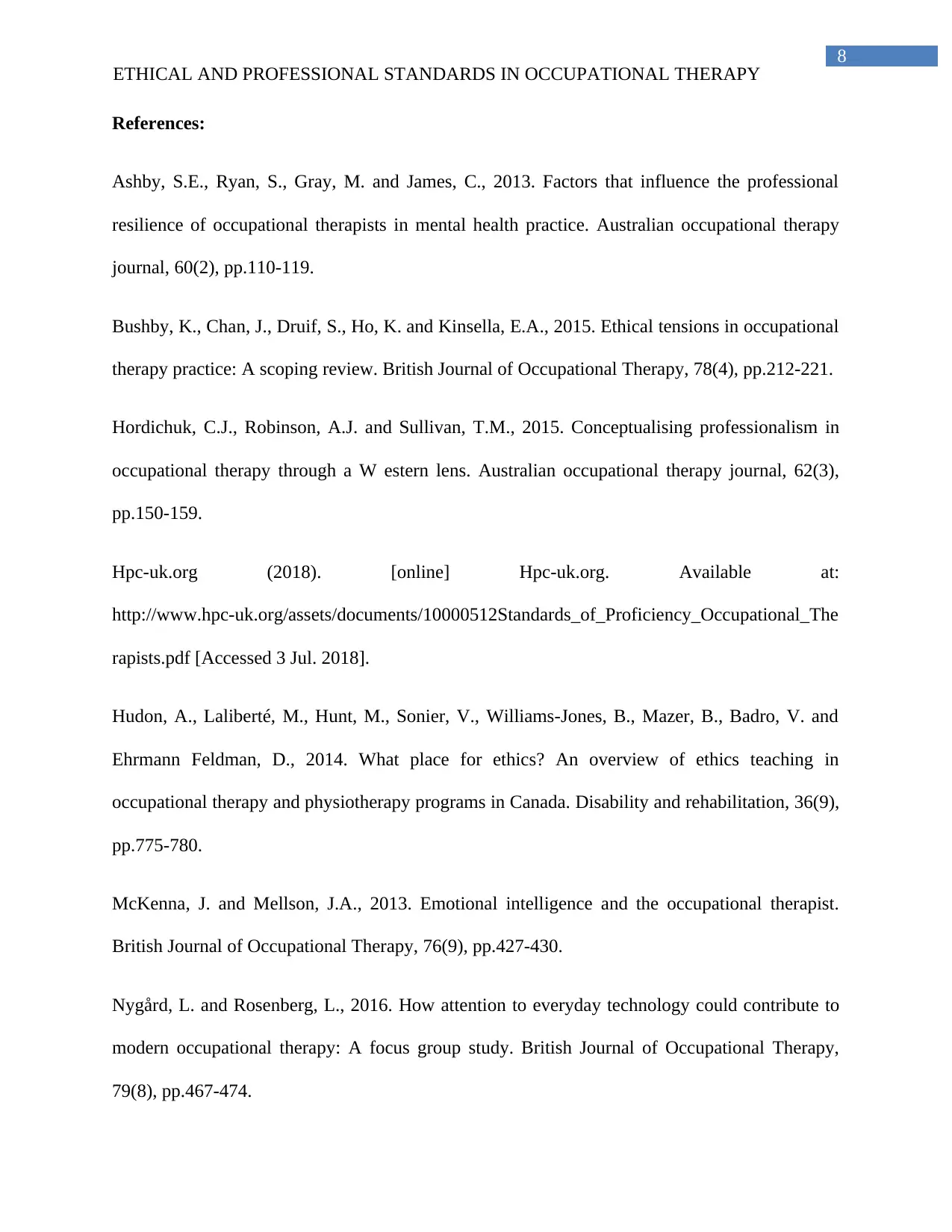
8
ETHICAL AND PROFESSIONAL STANDARDS IN OCCUPATIONAL THERAPY
References:
Ashby, S.E., Ryan, S., Gray, M. and James, C., 2013. Factors that influence the professional
resilience of occupational therapists in mental health practice. Australian occupational therapy
journal, 60(2), pp.110-119.
Bushby, K., Chan, J., Druif, S., Ho, K. and Kinsella, E.A., 2015. Ethical tensions in occupational
therapy practice: A scoping review. British Journal of Occupational Therapy, 78(4), pp.212-221.
Hordichuk, C.J., Robinson, A.J. and Sullivan, T.M., 2015. Conceptualising professionalism in
occupational therapy through a W estern lens. Australian occupational therapy journal, 62(3),
pp.150-159.
Hpc-uk.org (2018). [online] Hpc-uk.org. Available at:
http://www.hpc-uk.org/assets/documents/10000512Standards_of_Proficiency_Occupational_The
rapists.pdf [Accessed 3 Jul. 2018].
Hudon, A., Laliberté, M., Hunt, M., Sonier, V., Williams-Jones, B., Mazer, B., Badro, V. and
Ehrmann Feldman, D., 2014. What place for ethics? An overview of ethics teaching in
occupational therapy and physiotherapy programs in Canada. Disability and rehabilitation, 36(9),
pp.775-780.
McKenna, J. and Mellson, J.A., 2013. Emotional intelligence and the occupational therapist.
British Journal of Occupational Therapy, 76(9), pp.427-430.
Nygård, L. and Rosenberg, L., 2016. How attention to everyday technology could contribute to
modern occupational therapy: A focus group study. British Journal of Occupational Therapy,
79(8), pp.467-474.
ETHICAL AND PROFESSIONAL STANDARDS IN OCCUPATIONAL THERAPY
References:
Ashby, S.E., Ryan, S., Gray, M. and James, C., 2013. Factors that influence the professional
resilience of occupational therapists in mental health practice. Australian occupational therapy
journal, 60(2), pp.110-119.
Bushby, K., Chan, J., Druif, S., Ho, K. and Kinsella, E.A., 2015. Ethical tensions in occupational
therapy practice: A scoping review. British Journal of Occupational Therapy, 78(4), pp.212-221.
Hordichuk, C.J., Robinson, A.J. and Sullivan, T.M., 2015. Conceptualising professionalism in
occupational therapy through a W estern lens. Australian occupational therapy journal, 62(3),
pp.150-159.
Hpc-uk.org (2018). [online] Hpc-uk.org. Available at:
http://www.hpc-uk.org/assets/documents/10000512Standards_of_Proficiency_Occupational_The
rapists.pdf [Accessed 3 Jul. 2018].
Hudon, A., Laliberté, M., Hunt, M., Sonier, V., Williams-Jones, B., Mazer, B., Badro, V. and
Ehrmann Feldman, D., 2014. What place for ethics? An overview of ethics teaching in
occupational therapy and physiotherapy programs in Canada. Disability and rehabilitation, 36(9),
pp.775-780.
McKenna, J. and Mellson, J.A., 2013. Emotional intelligence and the occupational therapist.
British Journal of Occupational Therapy, 76(9), pp.427-430.
Nygård, L. and Rosenberg, L., 2016. How attention to everyday technology could contribute to
modern occupational therapy: A focus group study. British Journal of Occupational Therapy,
79(8), pp.467-474.
⊘ This is a preview!⊘
Do you want full access?
Subscribe today to unlock all pages.

Trusted by 1+ million students worldwide
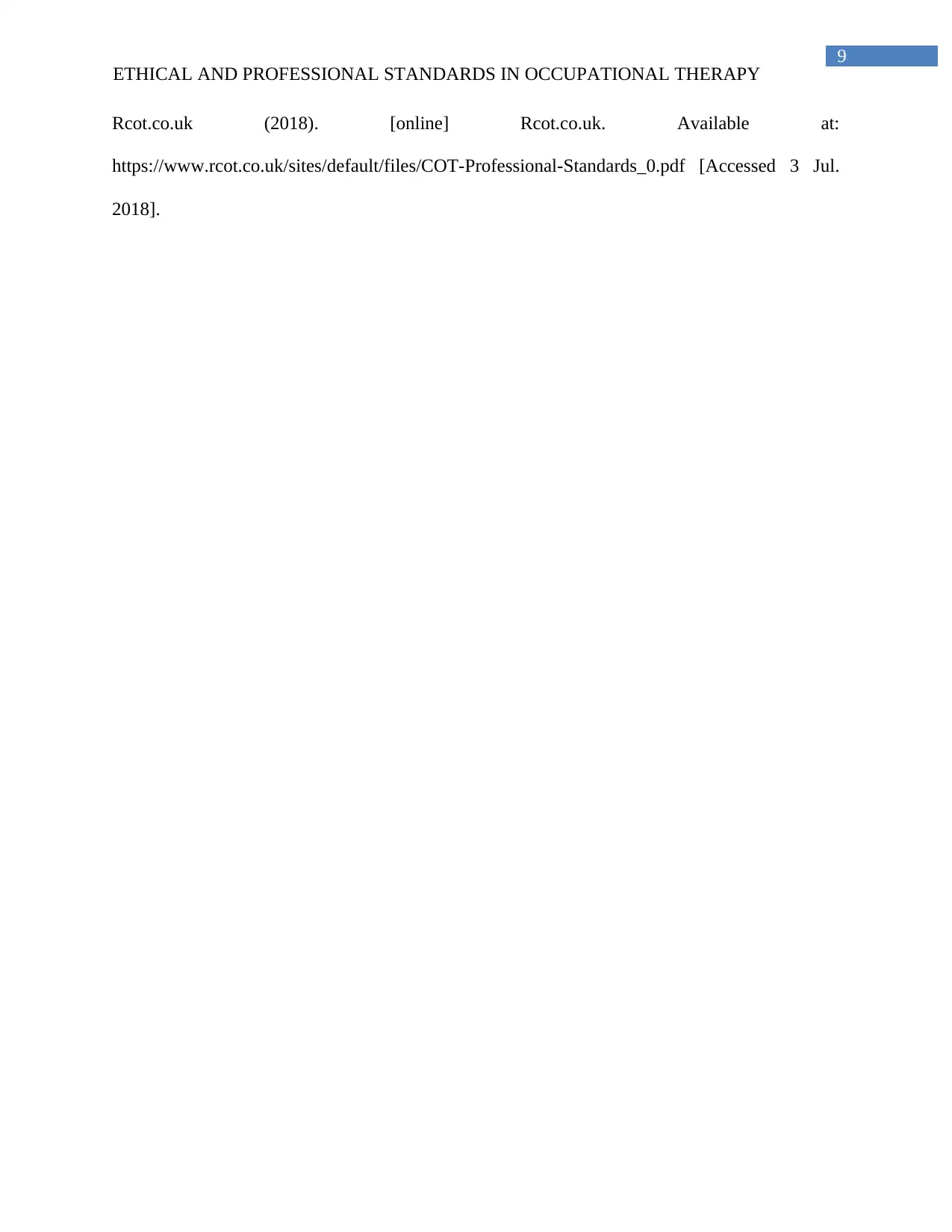
9
ETHICAL AND PROFESSIONAL STANDARDS IN OCCUPATIONAL THERAPY
Rcot.co.uk (2018). [online] Rcot.co.uk. Available at:
https://www.rcot.co.uk/sites/default/files/COT-Professional-Standards_0.pdf [Accessed 3 Jul.
2018].
ETHICAL AND PROFESSIONAL STANDARDS IN OCCUPATIONAL THERAPY
Rcot.co.uk (2018). [online] Rcot.co.uk. Available at:
https://www.rcot.co.uk/sites/default/files/COT-Professional-Standards_0.pdf [Accessed 3 Jul.
2018].
Paraphrase This Document
Need a fresh take? Get an instant paraphrase of this document with our AI Paraphraser
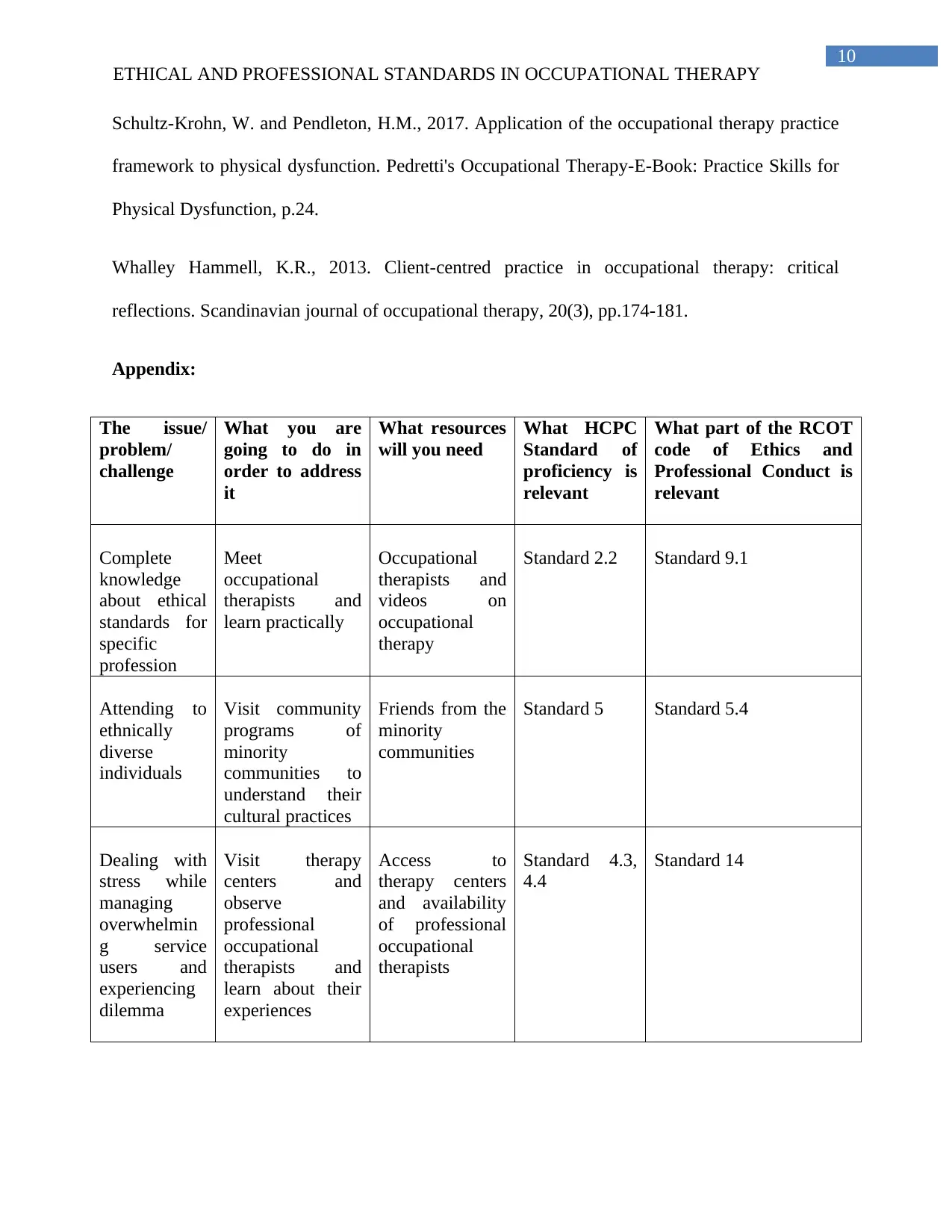
10
ETHICAL AND PROFESSIONAL STANDARDS IN OCCUPATIONAL THERAPY
Schultz-Krohn, W. and Pendleton, H.M., 2017. Application of the occupational therapy practice
framework to physical dysfunction. Pedretti's Occupational Therapy-E-Book: Practice Skills for
Physical Dysfunction, p.24.
Whalley Hammell, K.R., 2013. Client-centred practice in occupational therapy: critical
reflections. Scandinavian journal of occupational therapy, 20(3), pp.174-181.
Appendix:
The issue/
problem/
challenge
What you are
going to do in
order to address
it
What resources
will you need
What HCPC
Standard of
proficiency is
relevant
What part of the RCOT
code of Ethics and
Professional Conduct is
relevant
Complete
knowledge
about ethical
standards for
specific
profession
Meet
occupational
therapists and
learn practically
Occupational
therapists and
videos on
occupational
therapy
Standard 2.2 Standard 9.1
Attending to
ethnically
diverse
individuals
Visit community
programs of
minority
communities to
understand their
cultural practices
Friends from the
minority
communities
Standard 5 Standard 5.4
Dealing with
stress while
managing
overwhelmin
g service
users and
experiencing
dilemma
Visit therapy
centers and
observe
professional
occupational
therapists and
learn about their
experiences
Access to
therapy centers
and availability
of professional
occupational
therapists
Standard 4.3,
4.4
Standard 14
ETHICAL AND PROFESSIONAL STANDARDS IN OCCUPATIONAL THERAPY
Schultz-Krohn, W. and Pendleton, H.M., 2017. Application of the occupational therapy practice
framework to physical dysfunction. Pedretti's Occupational Therapy-E-Book: Practice Skills for
Physical Dysfunction, p.24.
Whalley Hammell, K.R., 2013. Client-centred practice in occupational therapy: critical
reflections. Scandinavian journal of occupational therapy, 20(3), pp.174-181.
Appendix:
The issue/
problem/
challenge
What you are
going to do in
order to address
it
What resources
will you need
What HCPC
Standard of
proficiency is
relevant
What part of the RCOT
code of Ethics and
Professional Conduct is
relevant
Complete
knowledge
about ethical
standards for
specific
profession
Meet
occupational
therapists and
learn practically
Occupational
therapists and
videos on
occupational
therapy
Standard 2.2 Standard 9.1
Attending to
ethnically
diverse
individuals
Visit community
programs of
minority
communities to
understand their
cultural practices
Friends from the
minority
communities
Standard 5 Standard 5.4
Dealing with
stress while
managing
overwhelmin
g service
users and
experiencing
dilemma
Visit therapy
centers and
observe
professional
occupational
therapists and
learn about their
experiences
Access to
therapy centers
and availability
of professional
occupational
therapists
Standard 4.3,
4.4
Standard 14
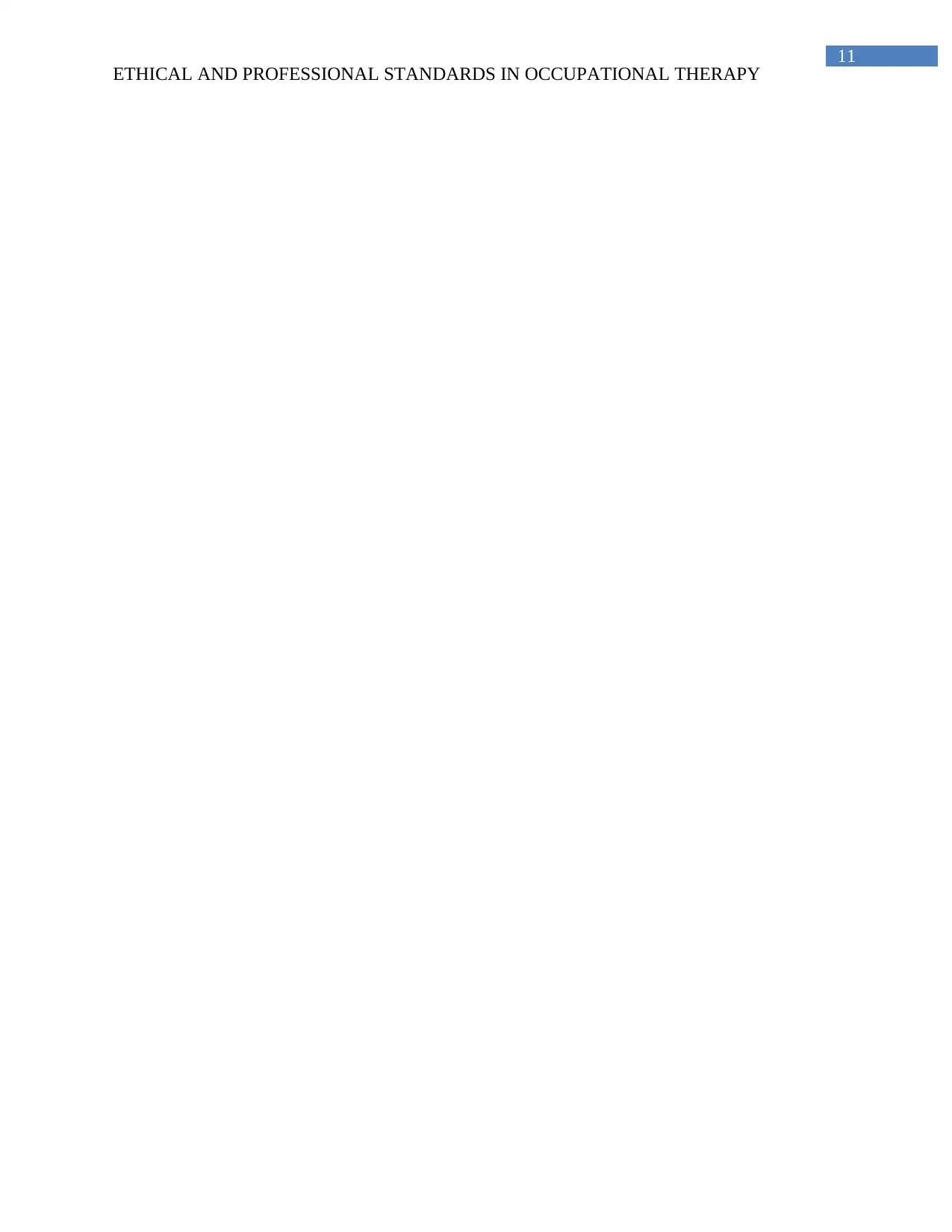
11
ETHICAL AND PROFESSIONAL STANDARDS IN OCCUPATIONAL THERAPY
ETHICAL AND PROFESSIONAL STANDARDS IN OCCUPATIONAL THERAPY
⊘ This is a preview!⊘
Do you want full access?
Subscribe today to unlock all pages.

Trusted by 1+ million students worldwide
1 out of 12
Related Documents
Your All-in-One AI-Powered Toolkit for Academic Success.
+13062052269
info@desklib.com
Available 24*7 on WhatsApp / Email
![[object Object]](/_next/static/media/star-bottom.7253800d.svg)
Unlock your academic potential
Copyright © 2020–2025 A2Z Services. All Rights Reserved. Developed and managed by ZUCOL.




